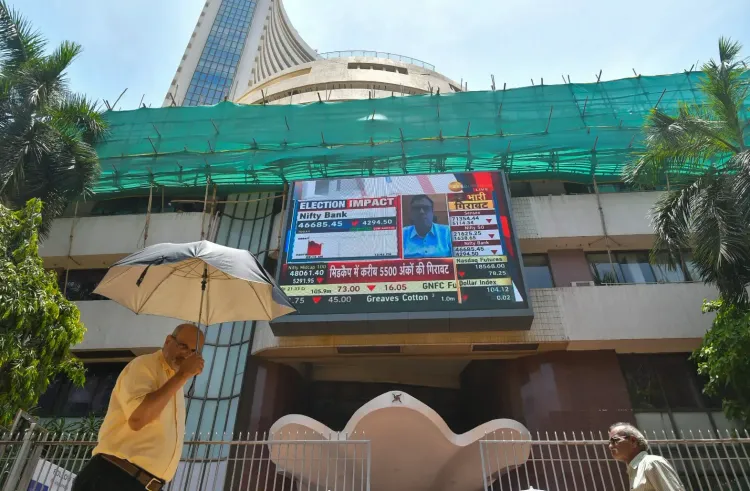Why Did Sensex and Nifty Open Significantly Lower Today?

Synopsis
Key Takeaways
- Sensex down 532 points at 82,778.
- Nifty declines 162 points to 25,347.
- Broadcap indices like Nifty Midcap 100 and Nifty Smallcap 100 underperform.
- Major gainers include SBI Life Insurance and ICICI Bank.
- All sectoral indices are trading in the red.
Mumbai, Nov 7 (NationPress) The Indian benchmark indices commenced the trading session with substantial declines on Friday, influenced by negative global cues and persistent selling by foreign institutional investors (FIIs).
As of 9:25 AM, the Sensex plummeted by 532 points, or 0.64 percent, settling at 82,778, while the Nifty saw a decrease of 162 points, or 0.64 percent, to reach 25,347.
The broadcap indices showed even greater losses, with the Nifty Midcap 100 down 0.89 percent and the Nifty Smallcap 100 experiencing a drop of 1.26 percent.
Among the major gainers in the Nifty Pack were SBI Life Insurance, Trent, Apollo Hospitals, and ICICI Bank, while notable losers included TCS, Titan Company, Tata Consumer, and Shriram Finance.
The Nifty Consumer Durables sector suffered the largest losses, declining by 1.38 percent. All sectoral indices were in the red, with the IT, auto, and real estate sectors falling by more than 1 percent.
Analysts noted that significant short selling by FIIs is overshadowing domestic institutional investor (DII) purchases in the market. The ongoing strategy of FIIs to sell off in India and redirect funds to cheaper markets has encouraged them to persist with this approach and continue shorting the market.
Dr. VK Vijayakumar, Chief Investment Strategist at Geojit Investments Limited, stated, "Short covering could trigger a trend reversal, but currently, there are no immediate catalysts for such a change. FII selling has led to reduced prices for well-valued large caps, especially within the banking and pharmaceutical sectors where growth potential remains strong."
Despite the bearish market sentiment, India's second-quarter FY26 earnings revealed a stronger-than-expected performance, with companies in key sectors, particularly midcaps, posting a 14 percent year-on-year earnings growth.
The US markets closed lower overnight, with the Nasdaq down 1.9 percent, the S&P 500 falling by 1.12 percent, and the Dow losing 0.84 percent.
Asian markets also experienced declines, mirroring the selloff in US stocks, driven by concerns over inflated valuations of artificial intelligence companies.
During the morning session, most Asian markets were trading in negative territory. China's Shanghai index fell by 0.17 percent, Shenzhen decreased by 0.17 percent, Japan's Nikkei declined by 2.16 percent, and Hong Kong's Hang Seng Index dropped by 0.98 percent. South Korea's Kospi fell by 2.57 percent.
On Thursday, foreign institutional investors sold equities worth Rs 3,263 crore, while domestic institutional investors were net buyers, acquiring equities worth Rs 5,284 crore.










